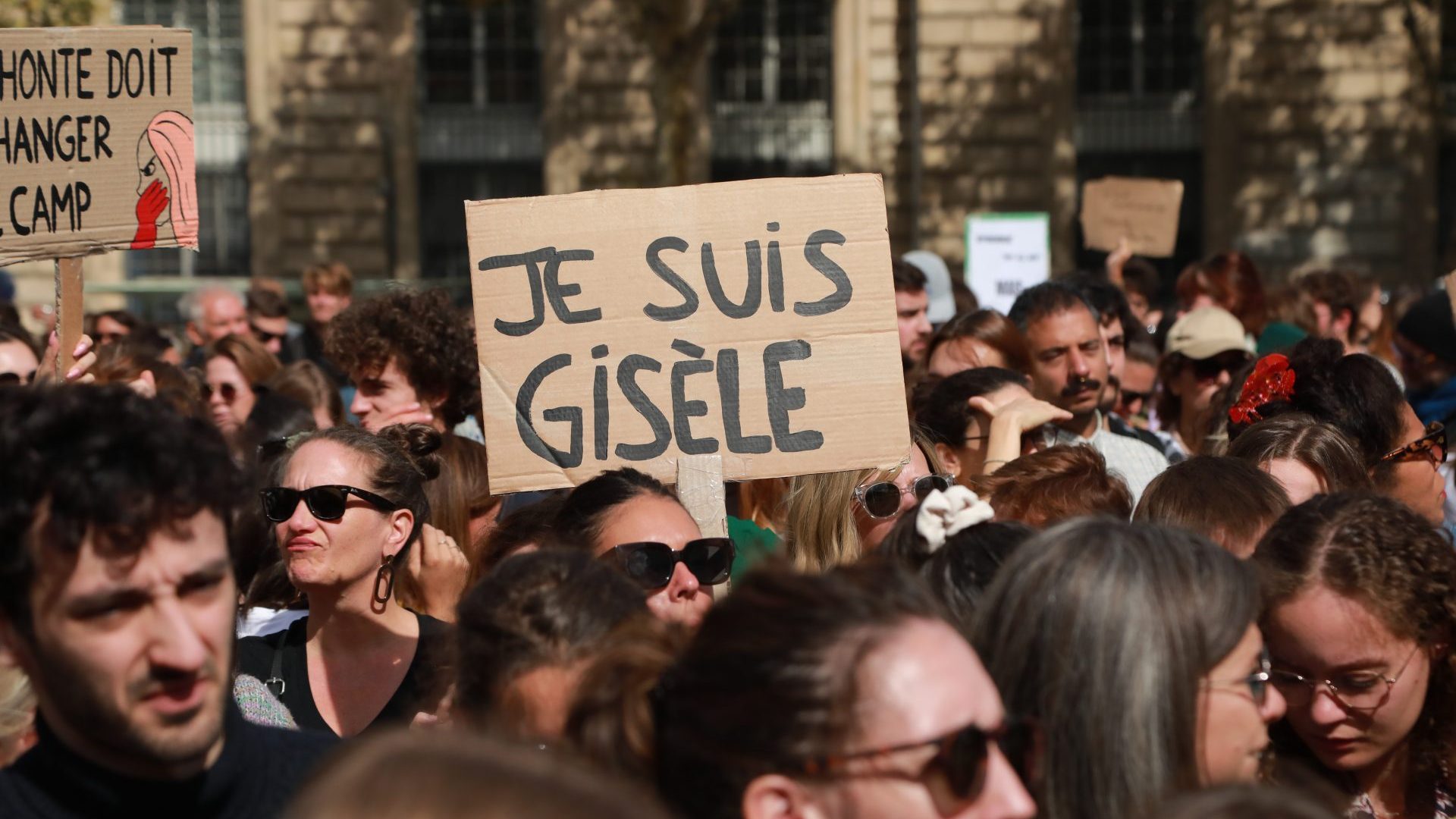The “super-trial” of Dominique Pelicot and 50 other men has become a socio-cultural earthquake, shaking the foundations of patriarchy in France. Pelicot is accused of drugging and raping his wife, Gisèle, and of inviting other men to abuse her, over nearly a decade. “It’s Volume 2 of Me Too,” said Laurence Rossignol, French Senator and former Minister for Families, Children, and Women’s Rights. “This case has sent the entire country into a state of shock, triggering collective post-traumatic stress among women.”
On TV and radio, on newspaper and magazine front pages and covers, Gisèle Pelicot is everywhere, the news of the trial easily eclipsing the ongoing political debates about France’s chaotic governing class.
The case has raised unsettling questions about how such crimes could occur and about the complicity of French society, that it could allow such horrors to unfold in silence. As the daily trial unfolds in Avignon, it is forcing the nation to confront deep-seated issues surrounding gender violence, power, and consent.
In many ways, Gisèle Pelicot has become the new face of the revolution: an unwitting icon for the feminist movement, both in France and globally. From the moment she publicly revealed her identity in court, she reclaimed control of her narrative. With her short hair, dark glasses, and unflinching determination, she has become a powerful symbol of a victim refusing to be silenced.
Unlike many survivors of sexual violence who opt for anonymity, Pelicot chose to face her attackers in an open trial, rejecting a private hearing. She allowed journalists to access evidence, including disturbing photos and videos, transforming her trauma into a catalyst for change. “Thanks to all of you, I have the strength to see this through,” she told the many women who flocked daily to the Vaucluse courtroom to support her.
They are not alone. The ongoing trial has drawn international media attention and a growing chorus of voices demanding justice, not just for Gisèle but for all women who have suffered sexual violence.
The crimes at the centre of the trial have become known as the “Mazan rapes,” named after the village in southern France where Gisèle lived with her husband for many years. Dominique Pelicot has confessed to drugging his wife with sleeping pills, filming the assaults, and inviting other men – ordinary citizens, including firefighters, nurses, truck drivers, and even lawyers – to rape her while she was unconscious.
Over the course of nearly a decade, Pelicot orchestrated these assaults by contacting men through the dating site Coco, which French authorities shut down in June 2023. Out of 83 potential suspects, 54 have been identified and 51 are currently on trial.
Pelicot is on trial almost by chance. In September 2020, he was caught secretly filming under women’s skirts in a shopping mall in Carpentras. Security found a second phone, a camcorder, a camera, and condoms in his bag. Pelicot claimed he was acting on “impulses” while his wife was away, insisting this behaviour was out of character. However, a search of his home computer in Mazan revealed over 100 videos and 300 photos showing his wife being raped by dozens of men. Investigators also found messages in which Pelicot invited these men to have sex with his unconscious wife, whom he had drugged with the strong sedative Temesta.
When shown the evidence, Gisèle Pelicot was shocked, as she had no memory of the events. Charged in November 2020, Dominique Pelicot has been in custody ever since, and has pleaded guilty to all charges. Their divorce was finally pronounced only as the trial began.
This case has deeply unsettled many people, particularly because the accused men are not outsiders or traditional criminals. They are, as the writer Lola Lafon noted in Libération, “not monsters lurking in the shadows, but our neighbours, co-workers, and friends.” Pelicot’s courage has forced France to face the banality of evil. “If these men, indistinguishable from average citizens, can commit such heinous acts, what does that reveal about our society?” Lafon said.
One of the most shocking aspects of the Pelicot trial has been the muted response from French political leaders. High-profile cases of this nature typically prompt swift reactions in the upper echelons of power, often leading to calls for legislative reform or public statements of outrage. Yet many prominent figures have remained conspicuously silent, with the notable exception of senator Rossignol. But the broader political silence speaks volumes about the general societal unease surrounding sexual violence, especially when it occurs within marriage, or male-dominated spaces.
Coming seven years after the original MeToo uprising began online to expose systemic sexual harassment and assault, in France the Pelicot trial is being hailed as the movement’s second wave.
Central to this reckoning is the question of consent. Under current French law, rape is defined by acts of violence, coercion, or surprise. Many legal scholars and feminists argue that this definition is too narrow, and fails to account for situations where victims are incapacitated or unable to consent, such as in cases of “chemical submission”.
Several European countries, including Sweden and the UK, have adopted consent-based laws that make clear that the absence of explicit, informed consent constitutes rape. Advocates in France are pushing for similar reforms, arguing that the existing legal framework does not adequately protect women from the full spectrum of sexual violence.
While the Pelicot trial has reignited calls for legal reform, for many women in France, the harrowing courtroom proceedings have provoked a deep reaction. Gisèle’s story resonates with countless survivors of sexual violence, who see their own experiences reflected in her testimony. As Nouvel Obs magazine put it, “the trial has been emotionally taxing, not only for the victim but for the nation as a whole”.

Gisèle Pelicot’s story has also sparked a broader conversation about the role of education in preventing sexual violence. Despite legal requirements for comprehensive sex education in French schools, only a small percentage of students receive instruction on issues like consent and healthy relationships. Many feminists have called for greater investment in programs that teach young people about respect, boundaries, and the importance of consent.
In the wake of the trial, some French men have begun to speak out about their discomfort and shame. Philosopher and writer Camille Froidevaux-Metterie revealed in an interview that her husband confided in her, saying he felt “ashamed of being a man” after hearing about the trial. This sentiment has been echoed by others, leading to a broader discussion about toxic masculinity and male accountability.
A group of 200 men, including several public figures, signed a petition published in Libération calling for men to take a stand against male violence, stop viewing women’s bodies as disposable, and dismantle what the petition describes as rape culture.
A younger generation of activists has also galvanised since Gisèle Pelicot took the stand. Many have taken to social media to express their outrage and demand change. On TikTok, thousands of videos have been posted under various hashtags related to the trial, some garnering millions of views. One viral trend features young women adopting the song “Labour” by Paris Paloma as an anthem to express their anger at societal inequalities. This youth-led movement has been instrumental in keeping the trial in the public eye. Many young people, particularly women, have been inspired by the case and are using their platforms to push for reform.
France has been shaken by the trial, yet it is uncertain whether lasting change will result. There was outrage when the mayor of Mazan, embarrassed that his small town has become internationally notorious as the rapists’ town, downplayed Gisèle Pelicot’s suffering by stating, “no one was killed”.
Some defence lawyers have suggested a hierarchy of rapes. “There is rape, and then there is rape,” asserted Guillaume de Palma, a lawyer for several defendants, on September 10. This shocking comment prompted Caroline Darian, Pelicot’s daughter and author of the best-selling book Why I Stopped Calling You Dad, to leave the courtroom in distress.
Darian, who was stunned to learn during the police investigation that her father had kept scores of images of her naked on his hard drives, has emerged as another symbol of resistance against the flimsy defence strategies of the accused. Many have denied that the rapes were “intentional”, claiming instead that they believed they were part of a consensual sexual scenario or a “threesome” gone wrong. However, this defence is weak, both legally and factually. Under French law, Pelicot is not required to prove she did not consent; rather, the court must evaluate each defendant’s actions to determine whether violence, coercion, threat, or surprise were involved.
Pelicot herself has said that she feels like the one on trial, particularly after defence lawyers showed graphic photos and videos of her, filmed by her husband while she was conscious. The implication was that such images somehow justified the years of rape and abuse she endured at the hands of over 51 men while drugged, all orchestrated by her husband.
Defense lawyer Nadia El Bouroumi, a self-proclaimed influencer, posted TikTok and Instagram videos of herself dancing to Wham’s “Wake Me Up Before You Go-Go” en route to court – a thinly veiled jab at Pelicot’s unconscious state during the rapes.
“They treat me like a garbage bag, a rag doll,” Pelicot said on September 7, standing resolutely in the Avignon courthouse.
A Le Point magazine editorial remarked that Pelicot’s testimony has compelled her attackers and the nation to confront the deeply ingrained belief that a woman’s body belongs to her husband. Marital rape after all was only recognised in France in 1990. One defendant even defended his actions by saying, “It’s his wife, he can do what he likes with it.”
“We are all Gisèle!” was the cry that rang out when thousands joined demonstrations earlier this month across France in response to the rape trial. The key message of this new feminist movement was: “The shame must change sides”. It is a slogan that should resonate globally, as online tools now permit the most horrific sexual abuse and assaults to occur, sometimes across national boundaries. Unlimited access to hardcore porn sites, of which many of the accused were active consumers, also help to fuel rape fantasies. How many videos can be found online by typing “unconscious porn” or “sleeping porn” into a search engine, showing women who, like Gisèle Pelicot, appear to be totally unconscious?
“The Internet makes it possible for anyone to commit an act,” stresses Rossignol. “Dominique Pelicot wouldn’t have found 80 rapists in the bakery”.



